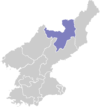Kapsan County
| Kapsan County 갑산군 | |
|---|---|
| County | |
| Korean transcription(s) | |
| • Chosongul | 갑산군 |
| • Hanja | 甲山郡 |
| • McCune-Reischauer | Kapsan-gun |
| • Revised Romanization | Gapsan-gun |
| Country | North Korea |
| Region | Ryanggang Province |
| Administrative divisions | 1 ŭp, 4 workers' districts, 20 ri |
| Area | |
| • Total | 1,200 km2 (500 sq mi) |
| Population (1988(est.)) | |
| • Total | 65,000 |
Kapsan County is a kun, or county, in Ryanggang province, North Korea. During the Chosŏn Dynasty, officials who had fallen into disfavor were often sent into internal exile there.
Kapsan lies on the eastern edge of the Kaema Plateau. The highest peak is Tongjomryongsan (동점령산, 2113 m). Although the majority of the county's area is mountainous, the terrain slopes downward toward the center and the Kapsan Basin. The county's chief stream is the Hochon River (허천강). Cultivation is largely restricted to the basin and river valley. Some 85% of the county's area is forestland. Due to its location on the Kaema Plateau, Kapsan has a severely cold continental climate.
The chief local industry is agriculture; major crops include rice (raised along the Hochon), as well as potatoes, hops, and honey. The O Il worker's district (오일로동자구) specializes in hops production; these "O Il Hops" are exported to other countries. Lumbering also plays a role, thanks to the extensive forests. There are various mineral deposits in the county, including lodes of copper, coal and copper pyrite.
There is a cable car railway in the county;[1] however, most transportation is by road.
During the Korean War (1950-1953), Korean guerrillas passed word to United Nations forces that a large number of top North Korean Communist leaders planned to gather in Kapsan in October 1951. Based on this information, eight AD Skyraider bombers from United States Navy Fighter Squadron 54 (VF-54) attacked their meeting place with 1,000-pound (454-kg) bombs and napalm. Intelligence evaluation indicated that the attack killed 500 Communists.[2][3]
See also
References
- ↑ CHAPTER XXXVIII: The X Corps Advances to the Yalu
- ↑ Knott, Robert C., Attack From the Sky: Naval Air Operations in the Korean War, Washington, D.C.: Department of the Navy Naval Historical Center, 2004, ISBN 0-945274-52-1, p. 52.
- ↑ Isenberg, Michael T., Shield of the Republic: The United States Navy in an Era of Cold War and Violent Peace, Volume I: 1945-1962, New York: St. Martin's Press, ISBN 0-312-09911-8, p. 176.
External links
- (Korean) In Korean language online encyclopedias:
| |||||||||||||
